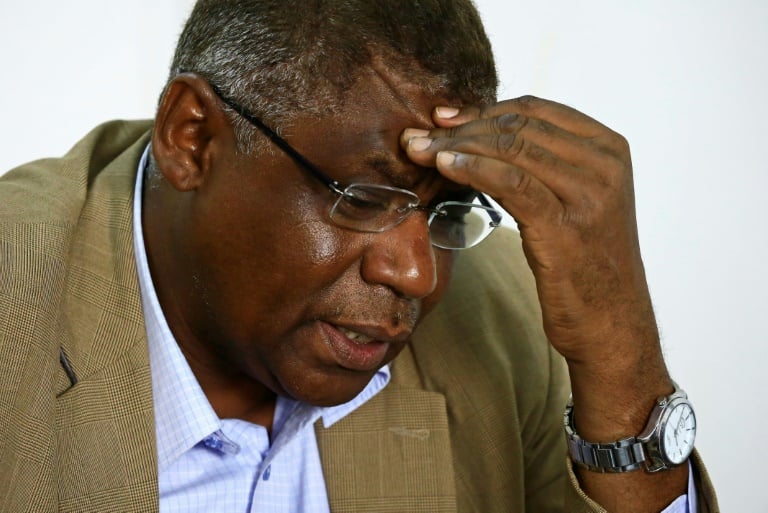“We are free to publish what we want on our online newspaper,” Baz, a former print newspaper editor, told AFP at the office of Al-Ahdath, the website he launched this year.
In a country of increasing media censorship, Baz is among several independent journalists who have left newspaper jobs and launched online papers or websites.
About a dozen internet papers have been launched in the past year alone as agents of the powerful National Intelligence and Security Service (NISS) continue to confiscate entire print-runs of newspapers over articles opposed to President Omar al-Bashir’s regime.
The authorities use several laws to curb press freedom, editors say, adding that the overall environment of media censorship has only grown since Sudan’s north-south divide in 2011.
“A print newspaper faces a new red line almost every day,” said Baz, who was jailed in the past for publishing articles critical of government policies in a newspaper he then owned.
In 2012, he shut down his paper, also called Al-Ahdath, after NISS agents confiscated its copies.
After working in Qatar for four years, Baz returned to Sudan last year to launch Al-Ahdath that now employs nine journalists.
The online journal has since run several stories criticising government policies, which he says would have been difficult to report in his print newspaper.
– New curbs expected –
Earlier this year, said Baz, it was Al-Ahdath that first reported on Bashir sacking his senior aide Taha Osman, who now resides in Saudi Arabia.

Adil al-Baz, editor of online newspaper Al-Ahdath News, at his office in downtown Khartoum
Osman’s sacking was later hotly debated in the Sudanese media.
Media watchdog Reporters Without Borders (RSF) ranked Sudan 174th out of 180 countries on its 2017 world press freedom index.
The NISS “hounds journalists and censors the print media”, RSF said.
In November, NISS agents confiscated entire print-runs of independent newspapers Al-Tayar, Al-Jadida, Al-Watan and Akhir Lahza.
These journals lost thousands of dollars worth of advertisements, apart from the huge expenses of printing copies that never hit the stands.
Curbs on press freedom are expected to grow if the cabinet approves a new press law under which Sudan’s press council would be authorised to ban a newspaper for 15 days without any court order.
Sudan’s existing press law requires the council to file for a court order if it wants to ban a newspaper for any longer than three days.
The draft law also permits the council to cancel licences of journalists and newspapers.
– Bright future –
Several newspapers are no longer financially viable because of the country’s weak economy and the threat from security agents.
Sixty percent of newspaper advertising comes from government-controlled organisations, said Ahmed al-Sheikh, editor of Sudan Times, another new internet paper.
Newspapers that are critical of government policies are hit hardest as authorities often cancel promised advertisements.
“Several newspapers are simply not in a position to offer good salaries to journalists,” Sheikh said. “And readers who previously bought two newspapers are now buying one to cut costs.”
The average monthly salary of a Sudanese newspaper journalist is about 3,000 Sudanese pounds ($445).
With the print media in difficulty, more online journals, all of them Arabic-language, are expected to be launched.
Sheikh said the censors have so far only been concerned with the print media.
“Sudanese authorities are still focusing on print media and have not yet seriously looked at the new online media, which explains why they continue to target newspapers more,” he said.
A journalist checks online newspaper Al-Ahdath News, one of a growing number of Sudanese news websites
Sheikh also said that some of the new online newspapers had their registered offices overseas, making them harder to target.
“The response to our online newspaper is very encouraging, with nearly 50,000 hits every day,” said Baz, adding that Al-Ahdath had started attracting online advertising.
In Sudan, the future for online journalism “remains bright” given the freedom of expression it is being allowed, said Osman Mirghani, editor of Al-Tayar newspaper.
Known as Sudan’s voice of independent journalism, Mirghani was briefly jailed in October over an article in his newspaper accusing Bashir’s family of corruption.
“Online journalists don’t face restrictions like print journalists,” said the US-educated engineer turned journalist, whose newspaper has been shut several times by NISS agents.
“They don’t face risks like newspapers, risks of copies being confiscated.”
Download our app and read this and other great stories on the move. Available for Android and iOS.